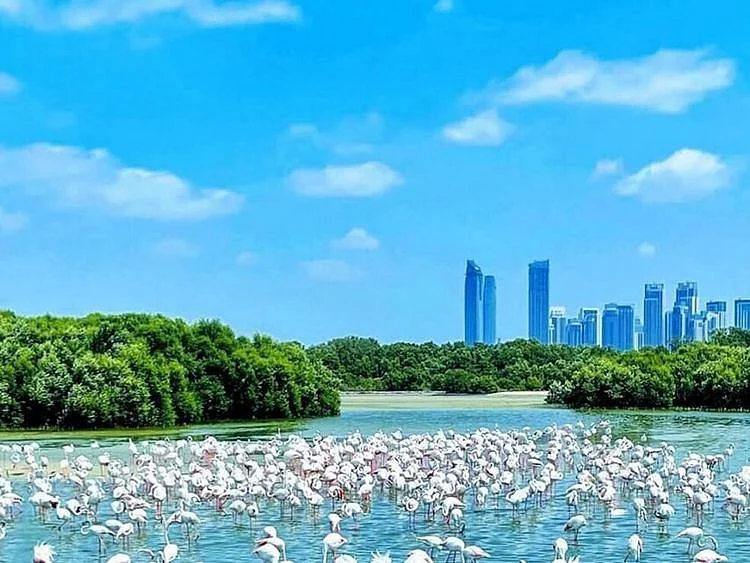Abu Dhabi to set noise and air pollution limits for establishments and projects
EAD Chairman Sheikh Hamdan bin Zayed issues resolution on air quality system

Abu Dhabi: All projects and establishments in Abu Dhabi will have to obtain an environmental license and comply with limits for air pollution and noise, it was announced on Friday.
Sheikh Hamdan bin Zayed, in his capacity as Chairman of the Board of Directors of the Environment Agency - Abu Dhabi (EAD), issued a decision regarding the air quality system, with the aim of preserving the environment, reducing air pollutants, and controlling noise levels within permissible limits within the emirate of Abu Dhabi.
The provisions of the air quality system apply to “all projects and establishments operating in Abu Dhabi”, and their work requires obtaining an environmental licence from EAD to protect the ambient air. The agency will prepare the executive decisions, practice guides, and the necessary guidelines to implement the provisions of this system and issue them as part of its annexes.
According to the decree, EAD will monitor and evaluate ambient air quality through environmental monitoring networks and periodically sampling monitor and evaluate air pollutants in accordance with the maximum limits for concentrations of ambient air pollutants.
Coordination to identify sites
There will be coordination with relevant authorities to identify monitoring sites and ambient air pollutants that should be measured by them. EAD will also evaluate the performance and effectiveness of ambient air quality monitoring stations and create plans and initiatives to develop the air quality monitoring network.
Among the tasks undertaken by EAD is the management of ambient air quality standards. This includes undertaking the task of setting the maximum limits for concentrations of ambient air pollutants in Abu Dhabi to ensure the protection of public health and environmental systems in coordination with the concerned authorities. EAD will also work with the authorities to ensure that the maximum concentration limits of relevant and applicable ambient air pollutants are not exceeded.
EAD will also prepare and review environmental studies and research to demonstrate the extent to which natural sources contribute to cases of exceeding ambient air quality standards and make recommendations based on their findings. The agency will also develop precautionary measures and response plans to deal with cases of exceeding the concentration of ambient air pollutants from natural sources in coordination with the concerned authorities.
Controlling emissions
The decree also addresses the agency’s tasks regarding controlling emissions from stationary sources. This includes setting standards and requirements for the project or facility that must implement a continuous monitoring system for its emissions. The decree also sets conditions and requirements for facilities when adopting a continuous emissions monitoring system.
The decree also specifies the owners’ responsibilities when it comes to standards, specifications and technical requirements, for obtaining the necessary environmental licences. It also states that an owner can apply to the EAD to obtain a temporary exception permit to exceed the noise or maximum limits for air pollutant emissions according to specific conditions.
Regarding noise levels, EAD will periodically monitor and evaluate noise levels through its monitoring networks, and coordinate with the concerned authorities to take all necessary precautionary measures to ensure that the maximum permissible noise limits are not exceeded. The agency will also manage the database of air quality, noise and emissions from stationary sources.
The decree also highlights the role of EAD in encouraging innovation by adopting new and effective ideas, initiatives, projects, solutions and technologies to reduce emissions with the aim of improving the ambient air quality in Abu Dhabi, as well as developing programmes and mechanisms for environmental incentives in the field of protecting the surrounding air from pollution.
Using techniques, equipment, modern technology and artificial intelligence methods will also be part of the monitoring and inspection operations, ensuring compliance with the requirements of the system.
Raising awareness
The decree also specified the agency’s role in raising awareness and educating people. In its role, EAD will coordinate with the concerned authorities, prepare and implement education and awareness programmes for community members and owners about the environmental damage of air and noise pollution. It will also provide information about legislation related to air quality and noise, decisions, standard operating procedures, and relevant technical guidance manuals, in order to comply and reduce violations and administrative penalties.
EAD will also be responsible for stimulating the development and implementation of research projects in the field of air protection. This will be done through partnerships with researchers and specialists in scientific research centres and universities, as well as motivating and encouraging all owners to follow the best environmentally friendly technologies.
Sign up for the Daily Briefing
Get the latest news and updates straight to your inbox
Network Links
GN StoreDownload our app
© Al Nisr Publishing LLC 2026. All rights reserved.